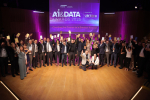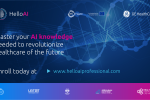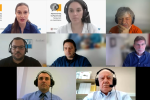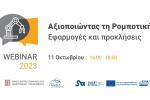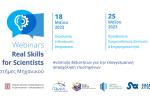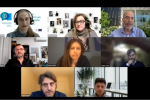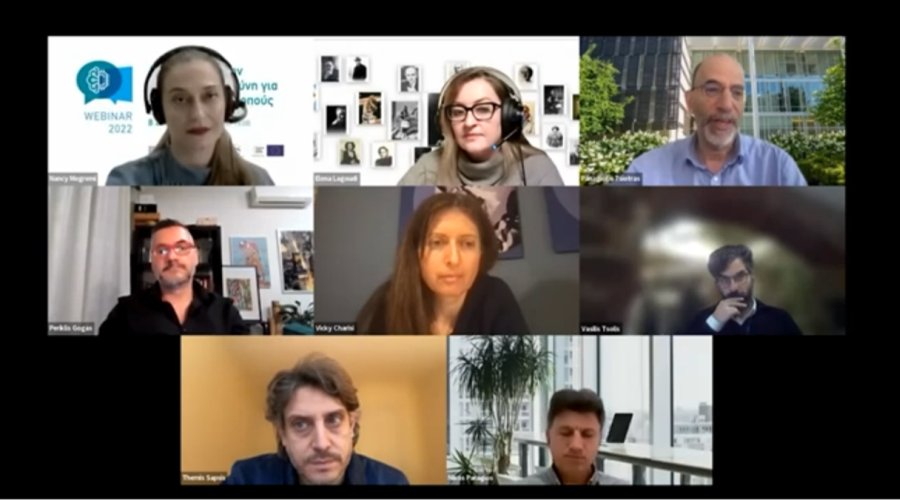
The impact of Artificial Intelligence (AI) in various disciplines and the applications of AI in everyday life were presented at the online event ‘Leveraging Artificial Intelligence for research purposes’, organised by the National Documentation Centre (EKT) within the framework of the ‘Knowledge and Partnership Bridges’ Initiative and the Enterprise Europe Network Hellas, in collaboration with the Hellenic Development Bank and held on Thursday 8 December 2022.
Aiming to familiarise researchers and young entrepreneurs with the use of Artificial Intelligence (AI) techniques, the event attracted the interest of more than 430 participants from various scientific fields. Qualified professionals gave information about these techniques and participants were able to ask their questions directly.
The event was opened by Dr. Nena Malliou, Head of the Indicators & Actions Department of RDI, EKT, who presented the role of EKT and the importance of informing the public about the use of cutting-edge technologies that improve the quality of daily life, and Panagiotis Papageorgiou, Director of the Innovation Department of the Hellenic Development Bank, who pointed out the excellent cooperation with EKT in information and education actions and he referred to the need for the two organisations to continue similar initiatives.
Then, Dr. Nikos Karampekios, Head of the Innovation and Networking Unit of EKT, presented in detail the actions of the ‘Knowledge and Partnership Bridges’ Initiative, inviting all participants to become members and benefit from the networking, guidance and education services offered by the Initiative to all Greeks wherever they are.
The legal implications and the ethical legitimacy of intelligent systems were presented by Vassilis Karkatzounis, Lawyer LL.M, PhD (c.) specialising in Information Systems and Technology Law. As he mentioned, it is quite difficult to define what the intelligent system is so as to ensure a targeted legal framework for the use of AI.
Pericles Gogas, Professor of Economic Analysis & International Economics at the Democritus University of Thrace, talked about the differences between AI and Machine Learning and presented corresponding everyday applications in economics, such as predicting energy consumption, preventing defective products, predicting demand for cash at ATMs, preventing financial crime, etc.
Vicky Harisi, Researcher, Joint Research Centre, European Commission, spoke in her presentation about AI and human behaviour, and especially about the cognitive development of children through their interface with robots. Through their research, they can identify how children interact with robots and how this contributes to their behaviour and emotional development.
The impact of AI on future robotic systems was presented by Panagiotis Tsiotras, Professor of Aerospace Engineering, Institute for Robotics and Intelligent Machines, Georgia Tech Institute of Technology, Atlanta (USA). As he pointed out, the current challenge of future robotic systems is the transition from automation to autonomy so that they can operate in unstructured and unpredictable environments and interact with humans. At the same time, he said that the robotics market will reach $90 billion in the next decade and robotics and AI will reach $1 trillion by 2030.
Nikos Paragios, Distinguished Professor, School of Engineering (CentraleSupelec), University of Paris - Saclay, President & CEO, TheraPanacea, spoke about the use of AI in healthcare for drug development, disease prognosis and diagnosis.
Vassilis Tsolis, CEO, Founder, Cognitiv+, presented the use of AI in commercial contract management, highlighting its importance in dispute resolution or contracting as AI contributes to the automation and acceleration of document finding and the management of legal information.
The difficulties of building engines at sea to deal with extreme events were presented by Themis Sapsis, Professor of Mechanical and Ocean Engineering, MIT. As he said, the disasters caused by climate change cost EUR 152 billion. dollars and extreme prediction models are essential for both policymakers and the insurance industry.
Finally, Elena Lagoudi, Museologist/Digital Curator at SearchCulture.gr, EKT, who closed the cycle of presentations, highlighted the use of AI in the Humanities, presented EKT's infrastructure and projects for finding cultural and scientific content (SearchCulture.gr, OpenArchives.gr), and referred to the business process for the promotion and distribution of such applications to the public.
The event concluded with the participants' questions to the speakers, who, each from their own discipline, highlighted the impact, contribution and future dimensions of AI in the various scientific fields.
The video and presentations of the event ‘Leveraging Artificial Intelligence for Research Purposes’ is available on the event's website. Finally, those who participated in the event are kindly requested to fill in the short feedback questionnaire, for the improvement of future seminars.
Watch the video of the webinar in Greek:









